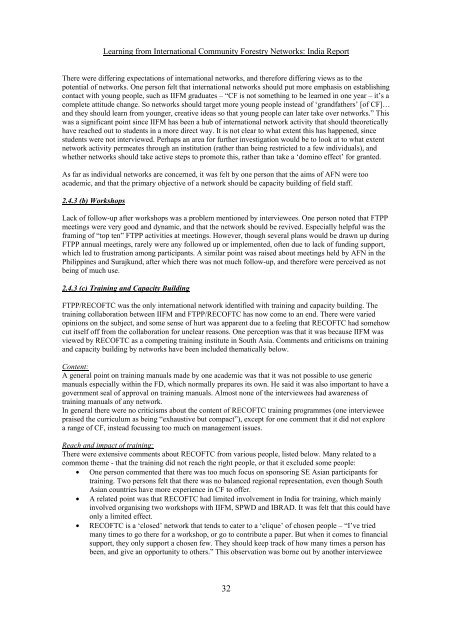Snapshots of International Community Forestry Networks: Country ...
Snapshots of International Community Forestry Networks: Country ...
Snapshots of International Community Forestry Networks: Country ...
Create successful ePaper yourself
Turn your PDF publications into a flip-book with our unique Google optimized e-Paper software.
Learning from <strong>International</strong> <strong>Community</strong> <strong>Forestry</strong> <strong>Networks</strong>: India Report<br />
There were differing expectations <strong>of</strong> international networks, and therefore differing views as to the<br />
potential <strong>of</strong> networks. One person felt that international networks should put more emphasis on establishing<br />
contact with young people, such as IIFM graduates – “CF is not something to be learned in one year – it’s a<br />
complete attitude change. So networks should target more young people instead <strong>of</strong> ‘grandfathers’ [<strong>of</strong> CF]…<br />
and they should learn from younger, creative ideas so that young people can later take over networks.” This<br />
was a significant point since IIFM has been a hub <strong>of</strong> international network activity that should theoretically<br />
have reached out to students in a more direct way. It is not clear to what extent this has happened, since<br />
students were not interviewed. Perhaps an area for further investigation would be to look at to what extent<br />
network activity permeates through an institution (rather than being restricted to a few individuals), and<br />
whether networks should take active steps to promote this, rather than take a ‘domino effect’ for granted.<br />
As far as individual networks are concerned, it was felt by one person that the aims <strong>of</strong> AFN were too<br />
academic, and that the primary objective <strong>of</strong> a network should be capacity building <strong>of</strong> field staff.<br />
2.4.3 (b) Workshops<br />
Lack <strong>of</strong> follow-up after workshops was a problem mentioned by interviewees. One person noted that FTPP<br />
meetings were very good and dynamic, and that the network should be revived. Especially helpful was the<br />
framing <strong>of</strong> “top ten” FTPP activities at meetings. However, though several plans would be drawn up during<br />
FTPP annual meetings, rarely were any followed up or implemented, <strong>of</strong>ten due to lack <strong>of</strong> funding support,<br />
which led to frustration among participants. A similar point was raised about meetings held by AFN in the<br />
Philippines and Surajkund, after which there was not much follow-up, and therefore were perceived as not<br />
being <strong>of</strong> much use.<br />
2.4.3 (c) Training and Capacity Building<br />
FTPP/RECOFTC was the only international network identified with training and capacity building. The<br />
training collaboration between IIFM and FTPP/RECOFTC has now come to an end. There were varied<br />
opinions on the subject, and some sense <strong>of</strong> hurt was apparent due to a feeling that RECOFTC had somehow<br />
cut itself <strong>of</strong>f from the collaboration for unclear reasons. One perception was that it was because IIFM was<br />
viewed by RECOFTC as a competing training institute in South Asia. Comments and criticisms on training<br />
and capacity building by networks have been included thematically below.<br />
Content:<br />
A general point on training manuals made by one academic was that it was not possible to use generic<br />
manuals especially within the FD, which normally prepares its own. He said it was also important to have a<br />
government seal <strong>of</strong> approval on training manuals. Almost none <strong>of</strong> the interviewees had awareness <strong>of</strong><br />
training manuals <strong>of</strong> any network.<br />
In general there were no criticisms about the content <strong>of</strong> RECOFTC training programmes (one interviewee<br />
praised the curriculum as being “exhaustive but compact”), except for one comment that it did not explore<br />
a range <strong>of</strong> CF, instead focussing too much on management issues.<br />
Reach and impact <strong>of</strong> training:<br />
There were extensive comments about RECOFTC from various people, listed below. Many related to a<br />
common theme - that the training did not reach the right people, or that it excluded some people:<br />
• One person commented that there was too much focus on sponsoring SE Asian participants for<br />
training. Two persons felt that there was no balanced regional representation, even though South<br />
Asian countries have more experience in CF to <strong>of</strong>fer.<br />
• A related point was that RECOFTC had limited involvement in India for training, which mainly<br />
involved organising two workshops with IIFM, SPWD and IBRAD. It was felt that this could have<br />
only a limited effect.<br />
• RECOFTC is a ‘closed’ network that tends to cater to a ‘clique’ <strong>of</strong> chosen people – “I’ve tried<br />
many times to go there for a workshop, or go to contribute a paper. But when it comes to financial<br />
support, they only support a chosen few. They should keep track <strong>of</strong> how many times a person has<br />
been, and give an opportunity to others.” This observation was borne out by another interviewee<br />
32

















![CynefinFramework final [Read-Only]](https://img.yumpu.com/19017304/1/190x135/cynefinframework-final-read-only.jpg?quality=85)